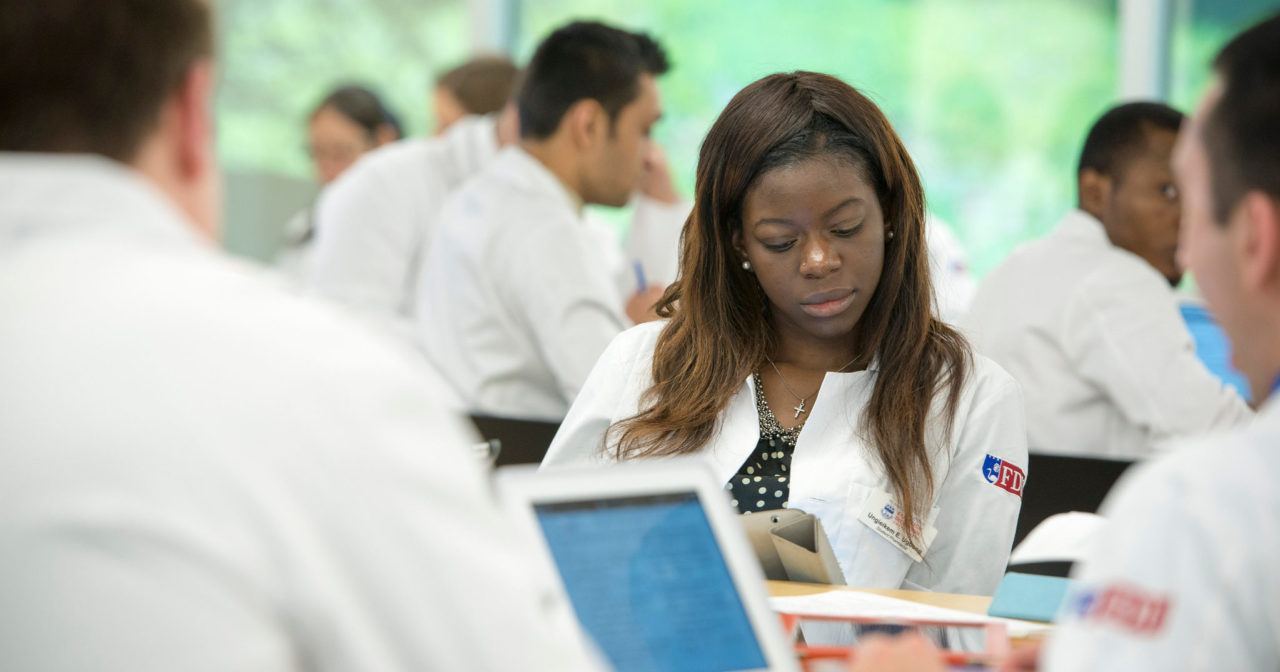Chemistry BS, Chemistry MS (Pharmaceutical Chemistry concentration): combined degree

The department of Chemistry, Biochemistry and Physics offers a five-year program that allows qualified students to attain a Bachelor of Science degree in chemistry and a Master of Science degree in chemistry with a pharmaceutical chemistry concentration.
Degree Plan
NOTE: All students are required to complete the General Education Requirements of their campus in fulfillment of their Bachelor degree requirements.
Semesters 1 and 2
- CHEM1201 General Chemistry I Lecture
- CHEM1203 General Chemistry I Laboratory
- CHEM1202 General Chemistry II Lecture
- CHEM1204 General Chemistry II Laboratory
Semesters 3 and 4
- CHEM2261 Organic Chemistry I Lecture
- CHEM2263 Organic Chemistry I Laboratory
- CHEM2262 Organic Chemistry II Lecture
- CHEM2264 Organic Chemistry II Laboratory
Semesters 5
- CHEM3241 Physical Chemistry I Lecture
- CHEM3243 Physical Chemistry I Laboratory
- CHEM3281 Biochemistry I Lecture
- CHEM3389 Biochemistry I Laboratory
Semester 6
Semester 7
- CHEM2211 Inorganic Chemistry Lecture
- CHEM2221 Analytical Chemistry Lecture
- CHEM2223 Analytical Chemistry Laboratory
- Pharm Chem Requirement
Semester 8
- CHEM2314 Inorganic Chemistry Laboratory
- CHEM4215 Advanced Inorganic Chemistry (or)
- CHEM4373 Polymer Chemistry
- CHEM4233 Instrumental Analysis Lecture
- CHEM4234 Instrumental Analysis Laboratory
- CHEM4401 Chemistry Seminar
- Pharm Chem Requirement (6 credits)
9th Semester
- Pharm Chem Requirement (6 credits)
- Pharm Chem Elective (3 credits)
- Graduate Elective (3 credits)
10th semester
- Pharm Chem Requirement (3-4 credits)
- Pharm Chem Elective (3 credits)
- Graduate Elective (6 credits)
Cognate Requirements
Semesters 1 and 2
Semesters 3 and 4
- PHYS2203 / PHYS2201 University Physics I Lecture / Laboratory
- PHYS2204 / PHYS2202 University Physics II Lecture / Laboratory
Major Requirements:
Science Electives: Any upper-level (3000 or 4000) undergraduate or graduate science course or Independent Study
Free Electives: May be chosen from any courses offered at the University after consultation with an advisor. (Student may not take BIOL1101-1102).
Major Electives: Take 1-8 credits of CHEM or BIOL. Please see an advisor for a list of courses
Advance Mathematics Course: select one course, three credits, from the following:
Graduate Courses for BS and MS degree: Students should consult with their advisors for course selections and new course offerings.
Required Courses: The following 12 credits must be taken
- BIOL6758 Advances in Pharmacology
- CHEM6673 Physical Organic Chemistry
- CHEM6781 Biochemistry
- CHEM6754 Drug Delivery Systems
Six/Seven (6-7) credits from the following:
- CHEM6755 Medicinal Chemistry (or)
- CHEM6752 Drug Design & Discovery (and)
- CHEM7737 Chemical Analysis of Pharmaceuticals (or)
- BIOL6845/BIOL6846 Molecular Biology Techniques with Lab
Pharmaceutical Chemistry Electives (6 credits)
- Any 5000 or higher level Marketing (MKTG), Management (MGMT), Pharmaceutical Chem (PHAR), Math (MATH), Biology (BIOL), Chemistry (CHEM), or Cosmetic Science (COSC) course
Graduate Electives (9 credits):
- Any 5000 or higher level CHEM, COSC or BIOL course.
A minimum of 120 credits is required for the BS degree, and a minimum of an additional 24-25 graduate credits is required for the MS degree, for a total of 144-145 credits for the combined degree.